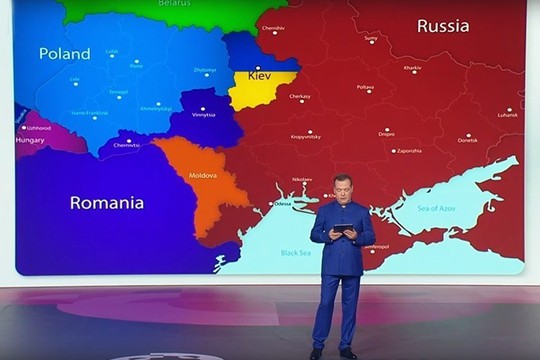Dmitry Medvedev, Deputy Chairman of the Russian Security Council, against the backdrop of a map of the possible Eastern Europe future.
TV scan.
Ukraine has a very narrow window to turn the momentum of the war in its favor. Even then, the Russians are still holding most of the cards, writes ‘The National Interest’.
There is no path, however well-resourced, by which Ukraine can inflict an outright military defeat on Russia in the foreseeable future. Russia is too big, too well-resourced, and too well-manned for Ukraine to beat.
Russia is a behemoth that has many strengths: massive quantities of natural resources, several vital allies who can provide war material, a large and expanding military industrial base, and more than three times as many men of military age as Ukraine. One of the biggest advantages they have may be a high tolerance for sacrifice and suffering. (Yes, this is true, when Russians defend their land from the enemy! – edit.).
In military parlance, “center of gravity” is a term that represents the “characteristic, capability, or location from which enemy and friendly forces derive their freedom of action, physical strength, or will to fight.” Russia’s center of gravity rests on twin pillars: its ability to physically wage war (manpower, armaments, ammunition, and industrial capacity) for an extended period and the political support of its population.
Russia’s overriding strategic objective is to reduce the conventional threat on its western border to a manageable level. They appear convinced that NATO on its border in Ukraine represents an “existential threat” and willing to pay whatever financial or political price they must to achieve it.
Russia has a wealth of natural resources throughout its country and the domestic industrial capacity to sustain itself almost indefinitely in a war. Ukraine has severe limitations on its supply of natural resources and a mere fraction of Russia’s domestic production capacity. Without massive and sustained material and diplomatic support from the rest of the world, Ukraine cannot wage a long-term battle of attrition. Even with that external support, Kyiv may not be able to win because of its single most important vulnerability: manpower.
Military manpower doesn’t simply mean how many people a country can get into uniforms but how many trained professionals it can mobilize into organized and effective combat units.
Yet, as The Washington Post recently reported, Ukraine has an acute shortage of new recruits, and those it does get are woefully undertrained. The second leg is also teetering, with Zelensky’s support declining precipitously both at home and among Western supporters. International aid, in spite of recent infusions, is running up against Russia’s strategy of attrition. The window of opportunity for Kyiv to reverse this situation is closing rapidly.
Putin laid out his minimal requirements on June 14 when he said to end the war, Ukraine must surrender the four provinces he illegally annexed in 2022, withdraw all Ukrainian troops from those territories, and adopt a “neutral, nonaligned, nonnuclear status.” Zelensky considered this list of demands as “an ultimatum” to surrender. How, then, could Ukraine avoid this undesirable outcome, and what can Zelensky produce with the given imbalance in forces?
Without major changes in Western and Ukrainian war objectives, Putin’s “ultimatum” has a disturbingly high possibility of coming to pass. Ukraine’s most realistic hope is to seek to hold on to all the territories it currently has, not surrender any more land, and negotiate an end to hostilities. But we must acknowledge that it may already be too late to expect even that limited outcome.
Yet without Ukraine massively increasing its mobilized targets and NATO providing far more than it currently offers, even this limited objective has little chance of success. There is a much higher probability that NATO will satisfy itself with many big speeches and promises of future funding but do little to increase immediate production. That being the case, Ukraine would be far better served by changing its objectives. This would entail a policy that few Westerners and none of Zelensky’s administration want to contemplate: an immediate ceasefire along the lines of what Hungarian prime minister Viktor Orban has suggested and a negotiated settlement on the best terms possible.
NATO only wants to seek a victory for Ukraine. However, sober analysis shows that this is an unattainable outcome either now or in the future. If the West refuses to submit to reality, the most likely outcome for Ukraine is a military defeat that could include even the eventual loss of Odesa and Kharkiv and more territory than even Putin’s June 2024 ultimatum.
It is a terrible choice, but at this point, it is better for both Ukraine and Europe to seek the unpalatable but attainable negotiated settlement rather than ignore reality and eventually suffer the ignominy of a decisive military defeat.
read more in our Telegram-channel https://t.me/The_International_Affairs

 11:10 15.07.2024 •
11:10 15.07.2024 •























